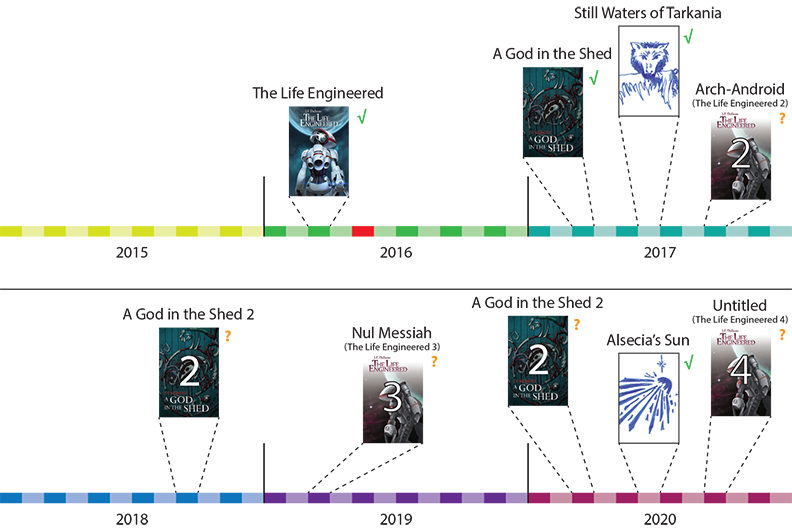I don’t post much on forums. I don’t even lurk. I probably should because. Who is this asshole injecting his stupid opinion into our forums, right?
For those who don’t know, I’m JF Dubeau, author of The Life Engineered and A God in the Shed, proud participants in the Too Many Controller anthology. Unlike what some of you might have heard I have not sold any rights to any of my properties YET, but I think it’s been made clear that things are moving in that direction.
The changes don’t bother me. Some of you may (and already have) rolled their eyes saying that, of course I don’t mind the changes. After all, I’m one of the privileged few.
Fair enough! I am so far very lucky. I can’t deny my good fortune and while I’m nowhere near the level of success some have assumed I’m enjoying, it’s been a good run and that run is all because of Inkshares. As a quick clarification, I’m still working full time as a marketing director. I have yet to receive any sum of money that would be considered life-changing and the number of groupies that knock on my door is still at a manageable two or three per day. Perhaps four on weekends.
And that’s the crux of it really. If you’re anything like me, an aspiring writer who’s only just starting to build his career and reputation, money shouldn’t be your focus. If it is, more power to you and I get that the changes in royalties are a concern but money isn’t part of my plan at this stage. I’ve so far not made that much money from royalties anyways, so moving the dial 15-30% one direction or another has very little impact on my life. The visibility, contacts, opportunities and pure, distilled experience I’ve gained so far however? I can’t even begin to put a price on that. Money will come. I have no doubt. If I put in the work (20-40 hours a week on top of my current job) and I keep learning and growing as a writer, I’ll either build up to where I have enough fans of my work that I can do this full time, or I’ll get a lucky break that will allow me to move ahead in the industry.
I’m very lucky so far because I’m (hopefully) following in the footsteps of the incredibly talented @Mike Mongo, but I’m looking forward to the next writer who’ll be following in my footsteps (unless these footsteps lead off a cliff. DO NOT follow these footsteps!). Then the next writer. And another. Because that’s what’s being built here. There are a ton of people on this platform who are embarrassingly talented and creative. I feel ridiculous being a trailblazer for them, knowing that they will outshine me like the sun outshines the moon. I’m hoping to ride their coattails like a bronco into the sunset.
So yeah, I’m cool with the changes. I can’t ask you to be cool with them, but I can tell you where I come from and hope you understand and maybe share my feelings. I’m even cool with the lack of transparency. Why? Because Inshares isn’t a vanity press. They’re not a self publishing service either. In other words, I’m not an Inkshares client. They don’t owe me transparency and in many ways it is a curtesy that we get as much as we do (truth is that it’s a synergy thing where they benefit from our feedback, but the bottom line is that transparency isn’t owed to us).
I’ve written this stupid essay three times, each from a different angle and each time with a different level of aggression.
The big takeaways are these:
- The terms are what they are and they’re not aimed at ‘screwing us over’
- The invitation to leave isn’t meant to be dismissive but at the same time there’s only so much resources that should be put into keeping a disgruntled supplier, especially in such a saturated market
- The increased revenue from getting a bigger share of royalties will help make books more financially viable on their own, keep investors happy, allow for growth so that more services can be added and the current ones improved. It’s an investment by the authors in the future not of Inkshares but of their success as authors on Inkshares
- Communication is nice to have and I believe it is Inkshares’ philosophy to have as much of it as possible, but if they don’t have time to tell us everything they’re doing I’m fine with that too. I’d rather they work on publishing, marketing and selling books
- Every success on Inkshares benefits all of the authors on the platform. The rising tide lifts all boats
An extra note: Each book, from my understanding, is looked at individually for how it should be handled in the secondary markets. Mike Mongo and I are living vastly different experiences and I expect that will be the case for everyone who gets this opportunity. Which means someone is siting down, looking at each property and deciding whether to pursue it at this time (The Life Engineered is not being pursued as far as I know) and then building a plan on how best to do that. Aside from the fact that this is a time consuming aspect of the work I hadn’t really considered before, I am FASCINATED by it and want to learn more.
This is a cool platform in its infancy. It’s growing in interesting ways and I’m happy to be along for the ride because I’m a writer in his career infancy and I want to grow right along with them in interesting ways. So no, I’m not exiting. I might ADD to what I do with Inkshares with other projects, but I know that these are just more opportunities that my experience with this platform have created.
Cheers, and keep writing
JF






